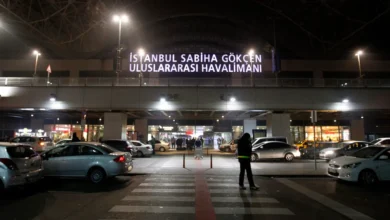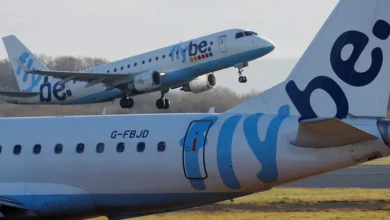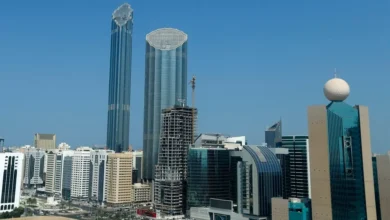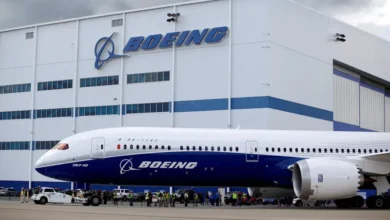Etihad Airways at 20: Two decades of growth for the UAE’s national carrier
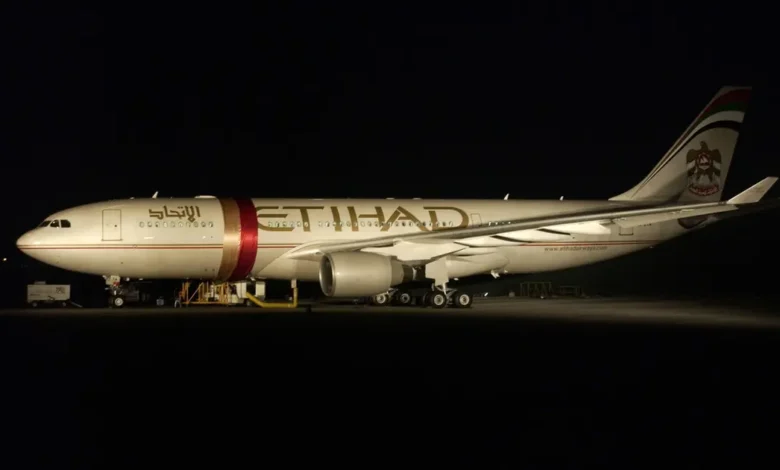
It was 20 years ago, in 2003, that the UAE’s national airline Etihad Airways was launched by a royal decree by the late Sheikh Khalifa Bin Zayed Al Nahyan.
In the past two decades, the airline has evolved into a global aviation leader, more than quadrupling its original 1,761-strong workforce to more than 9,250 employees as of September 2023 and boosting its aircraft fleet from just two in its early stages to a total of 79.
The airline now flies to more than 70 destinations – up from four in 2003 – and currently has a roster of 1,350 weekly departures, up from 128 departures in its initial year of operations.
The airline has now unveiled plans to double its fleet and welcome three times more guests, reaching 30 million people each year by 2030.
Here is a look at the airline’s two-decades of aviation growth:
2003
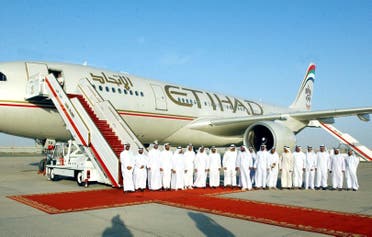
In its inaugural year, Etihad Airways took to the skies with a ceremonial flight over all seven emirates of the UAE. It marked the beginning of a journey that would soon extend its reach globally, with the first commercial flight to Beirut.
2004
Etihad Airways quickly gained recognition as it was named the “World’s Leading New Airline” by the World Travel Awards. The airline expanded its horizons with flights to London and Cairo and introduced its cargo division, Etihad Crystal Cargo.
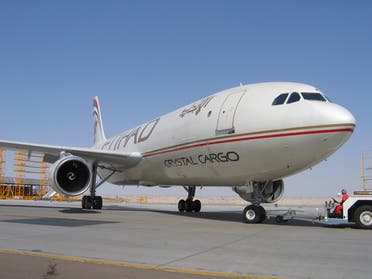
2005
A significant milestone was reached as Etihad flew one million guests in a year, emphasizing its rapid growth. The airline expanded further into North America with its Toronto flight.
2006
Continuing its ascent, Etihad Airways was awarded “World’s Leading New Airline” by the World Travel Awards for the third consecutive year. The airline introduced the Etihad Guest program, enhancing its customer experience.
2007
Etihad’s expansion took a global turn with its first flight to Sydney, Australia. It was also recognized with the “Middle East’s Leading Airline” award by the World Travel Awards and initiated Hajj flights for pilgrims.
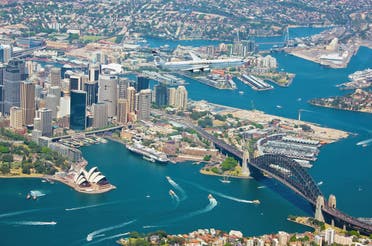
2008
Passenger numbers soared with a 34 percent annual increase, and a new runway opened at Abu Dhabi International Airport. Etihad unveiled a groundbreaking aircraft order at the Farnborough Airshow.
2009
Etihad made its presence known globally as the title sponsor of the Formula 1TM Etihad Airways Abu Dhabi Grand Prix and through an official partnership with Manchester City FC. Terminal 3, dedicated to Etihad Airways, was opened in Abu Dhabi.
2010
The Etihad Guest program achieved a milestone of over one million members, and the airline welcomed Katrina Kaif as its brand ambassador. Etihad Crystal Cargo introduced the Airbus A330-200F.
2011
Manchester City FC’s home stadium was renamed the Etihad Stadium. Stopover packages were introduced for guests transiting through Abu Dhabi. Etihad Cargo received its first Boeing 777 freighter, and the airline hosted the Arab Air Carriers Organization annual meeting in Abu Dhabi.
2012
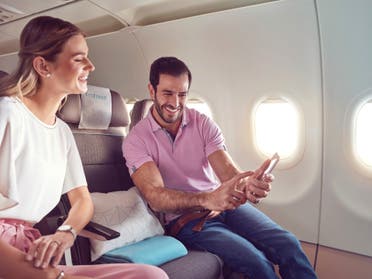
With over 45 million guests flown since 2003, Etihad introduced in-flight Wi-Fi and renamed Etihad Crystal Cargo to Etihad Cargo. The first Etihad flight using biofuel flew from Seattle to Abu Dhabi.
2013
Etihad Airways became one of the few airlines to serve all inhabited continents. It also received the “World’s Leading Cabin Crew” award from the World Travel Awards and expanded frequencies on 18 existing routes.
2014
Etihad welcomed the Airbus A380 to its fleet, unveiled a new aircraft livery and cabin crew uniform, and opened the Middle East’s first US Immigration pre-clearance facility in Abu Dhabi. The Residence, a unique three-room suite in commercial aviation, was launched.
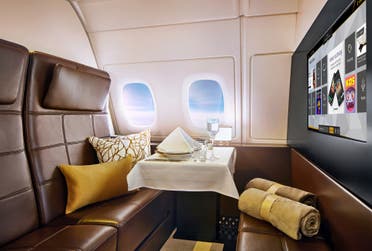
2015
The Boeing 787 joined Etihad’s fleet, and the airline received accolades like “Cargo Airline of the Year” and “Airline of the Year.” Etihad’s First Class was crowned the world’s best at the World Travel Awards, and new boarding music was introduced as part of the Flying Reimagined campaign.
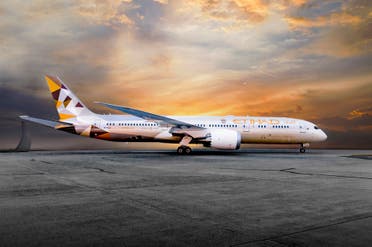
2016
Etihad Airways was recognized as the “World’s Leading Airline” for the eighth consecutive year by the World Travel Awards and received its first full-mark 5-star rating by Skytrax. The newly opened First-Class Lounge & Spa won the “Middle East’s Leading Airport Lounge” award. It was also named the “Most Innovative Airline of the Last Ten Years” by the Telegraph ULTRAs Awards.
2017
Etihad Airways continued its winning streak with awards such as “Skytrax World’s Best First Class,” “Best First Class Seat,” and “Best First Class Catering.” The airline announced a donation program, pledging AED 1 for every flight ticket sold in 2017. The Airbus A340 airliner was phased out.
2018
Etihad introduced Economy Space and achieved a unique feat when its chef broke the world record for the world’s highest pop-up restaurant at Everest Advanced High Camp. New Acqua Di Parma amenity kits enhanced the passenger experience.
2019
In a historic moment, Etihad Airways flew Pope Francis back to Rome after his visit to the UAE. The airline also launched the Greenliner program and became the official airline partner of the Special Olympics World Games Abu Dhabi 2019, carrying over 4,000 athletes from 100 countries. Etihad operated the world’s first flight using biofuel made in the UAE.
2020
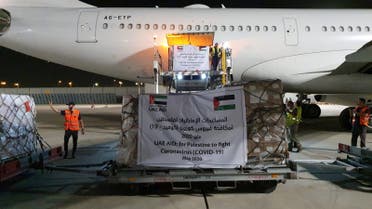
The global pandemic led to the temporary grounding of Etihad’s fleet. In response to the crisis, Etihad sent its largest aircraft, the Airbus A380, to Wuhan for evacuation missions and operated over 100 humanitarian and repatriation flights. Air Arabia Abu Dhabi, a joint venture, took flight, and new boarding music inspired by Abu Dhabi was introduced.
2021
Etihad Airways continued to make strides as the Etihad Arena opened on Yas Island, Abu Dhabi. The Middle East’s largest outdoor venue was renamed Etihad Park. The airline celebrated the UAE’s 50th National Day with a special livery and launched carbon offset programs.
2022
Etihad Airways welcomed the Airbus A350 to its fleet, operated over 40 EcoFlights, and celebrated its 10 millionth guest of the year. It became the first international airline to operate long-haul passenger flights to the top three Chinese gateways since the pandemic. The Etihad Aviation Group was formally transferred to ADQ, an Abu Dhabi-based investment and holding company.
2023
Etihad Airways continued its expansion and innovation by opening Terminal A and bringing the Airbus A380 back into service. It introduced 10+ new destinations, more flights, and improved flight times. In addition, Etihad unveiled Armani/Casa tableware and textiles in Business Class, was ranked the Middle East’s most punctual airline by OAG, and proudly transported Manchester City players after their historic UCL win. Moreover, Wi-Fi became free for Etihad Guest members, and the airline received the “Five-Star Global Airline” award by APEX for the third consecutive year.
Commenting on Etihad Airways 20th anniversary, Mohammed Ali Al Shorafa al-Hammadi, Chairman of Etihad Airways, said the airline continues to have strong expansion plans.
“Two decades ago, the visionary leaders of the UAE, along with Etihad’s founder, embarked on a journey with a profound vision for the Emirate of Abu Dhabi and the UAE. This vision required a key player, an international airline that would serve as a bridge for trade, investment, and tourism. It was to foster international relationships and place Abu Dhabi firmly on the global map. The birth of Etihad Airways marked the realisation of that wise vision,” he said.
Al-Hammadi said, looking ahead, Etihad Airways remains firmly committed to the vision of the airline’s founding leaders.
“As we mark Etihad Airways’ 20th anniversary, we’re excited about what’s next. Our journey so far has been about more than flights; it’s been about bringing people and cultures together, creating strong connections, and making Abu Dhabi a key travel hub, helped by the UAE’s prime location.”
“Looking ahead, we have big plans. By 2030, we aim to double our fleet and welcome three times more guests, reaching 30 million people each year, welcoming so many more people to enjoy the excitement and the hospitality of our home, as well as connecting to our growing global network. And our dreams go beyond numbers. We want to make every journey something special and reach even more places around the world. Our rich past is the perfect starting point for these bold steps forward. Let’s look to the future, driven by the passion that has been with us from the start.”

